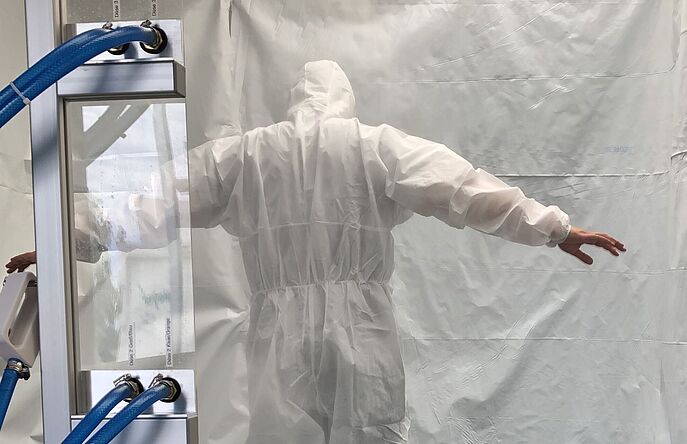BÖNNIGHEIM (aba) Since April 2023, the testing service provider Hohenstein has been testing and certifying in two new areas in the field of protective clothing: protective suits and gloves against chemicals and infectious agents. These are covered by Regulation (EU) 2016/425 and are therefore personal protective equipment (PPE). They protect people who do valuable and sometimes dangerous work for our society.
Protective clothing against infectious agents is used in many types of work: for example, work at sewage plants, waste disposal, animal care, disposal of hazardous waste from hospitals, etc. Workers are exposed to unknown infectious agents (microorganisms, parasites). The protective clothing should protect wearers from the mediums in which the microorganisms are contained, such as liquids, aerosols or solid dust particles.
A chemical protective clothing is a personal protective equipment that protects the person wearing it from chemicals that surround him/her in a gaseous, liquid and / or solid state. They are classified into 6 types with different protection levels from gas-tight to restricted liquid-tight.
Hohenstein tests and certifies the following types:
- EN 14605: Protective clothing against liquid chemicals: Liquid-tight (type 3) or spray-tight (type 4) as well as partial protection types PB[3] and PB[4]
- EN 13982-1: Protective clothing against airborne solid particulates: Type 5
- EN 13034: Protective clothing against liquid chemicals: Type 6 and PB[6]
Detailed information is available at:
www.hohenstein.com/chemical-protection
www.hohenstein.com/infection-protection
About Hohenstein
For more than 75 years, Hohenstein has specialized in testing, certification and research of textile products. As an internationally recognised partner, Hohenstein supports companies along the value chain in successfully bringing products to market - from sharing new findings from the research to independent testing and certification, to claim support and marketing at the point of sale. Now managed by the third generation, more than 1,000 employees at the headquarters in Boennigheim, Germany, as well as in the laboratories and offices around the world, work on customized testing and services for all unique requirements.
